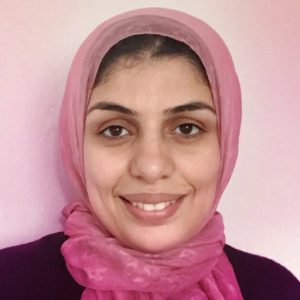Faculty Spotlight: Omayma Alshaarawy, MBBS, PhD
Omayma Alshaarawy, MBBS, PhD, is an assistant professor in the Department of Family Medicine.
What brought you to MSU and Family Medicine?
I came to MSU in 2013 as a postdoctoral researcher. I was lucky to be working with a great mentor, who thinks 10 years ahead. I was encouraged to seek definitive answers for my research questions, even if this means a new training in a new discipline. I then started animal research training at MSU. I was excited to apply for the position advertised by the department of Family Medicine. The department mission aligns perfectly with my goal of advancing population health. Moreover, the department houses outstanding faculty with nationally and internationally recognized expertise. So glad to be here!
What are your research interests and what kind of researchers would you be interested in working with?
My research is focused largely on cardiometabolic health, which encompasses cardiovascular and metabolic diseases including obesity, metabolic syndrome and type 2 diabetes. I am interested in understanding the impact of 1) exposure to environmental chemicals, and 2) lifestyle behaviors such as drug use on cardiometabolic health. Another line of research I am involved in relates to trends and patterns of extra-medical drug use among women of reproductive age. I welcome collaborations with students, trainees and faculty with similar research interests.
What are you currently researching?
I am studying how cannabinoids (including marijuana) affect inflammatory responses and cardiometabolic health. This is an important and timely topic, not only because of the recent legalization of marijuana, but also due to the emergence of the cannabinoid system as a target for pharmacotherapy.
What got you interested in doing this kind of research?
It was a cumulative process for me. After obtaining my medical degree, I completed a compulsory service in a primary care clinic in rural Egypt. More than 50% of the adults served by the clinic suffered a stroke, coronary heart disease, or diabetes. The burden of these chronic conditions intrigued me to study them early before manifesting in a full-blown form. I joined a clinical pathology residency to be formally trained in biomarkers of early disease detection and disease progression. I then moved to the US and obtained a graduate degree in Epidemiology, which allowed me to study these conditions on the general population level.
What do you plan on researching in the future?
I plan to continue this line of research, while integrating an interdisciplinary approach of animal studies and human epidemiological surveys. The use of experimental animal models will help us to study mechanistic links that cannot be studied in humans. Also, I plan to study methods for recruitment to increase participation in population-based surveys of sensitive topics such as extra-medical drug use.



